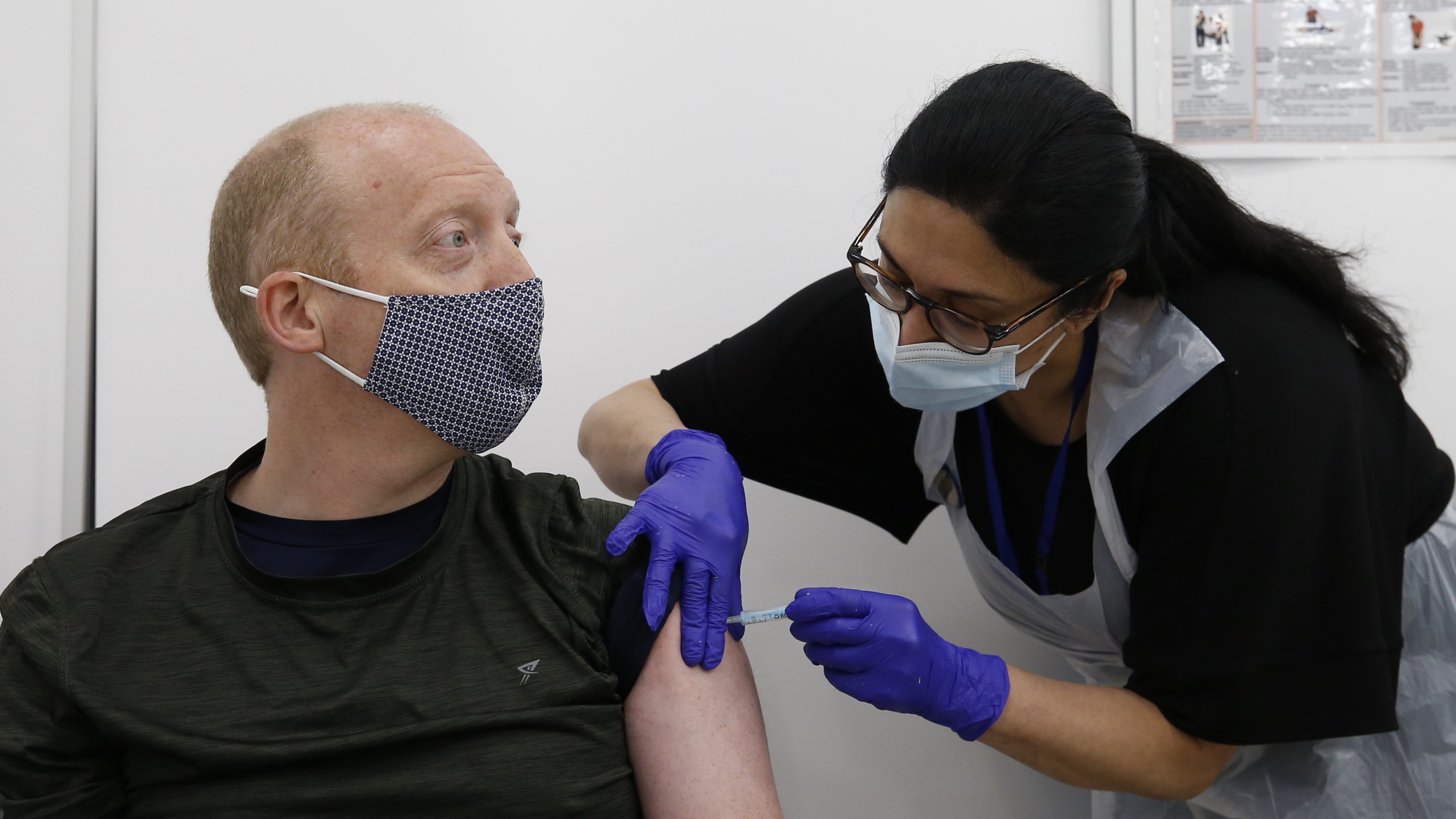Can booster jab nullify new Covid-19 threats?
Trials under way for a third vaccine shot for over-50s to eradicate danger from coronavirus variants

A free daily email with the biggest news stories of the day – and the best features from TheWeek.com
You are now subscribed
Your newsletter sign-up was successful
A third booster jab for Covid-19 could be offered to all over-50s in the autumn in an effort to drastically reduce the likelihood of another lockdown in the UK.
The extra shot might be given alongside annual flu vaccinations to those aged over 50 and the clinically vulnerable, according to The Times.
The newspaper reports that trials of two options are under way, supervised by the chief medical officer for England, Chris Whitty. Early findings have “raised government hopes” that the two approaches will “nullify any threat from new and existing variants” of Covid-19, which has already led to 150,000 deaths in the UK alone, The Times was told.
The Week
Escape your echo chamber. Get the facts behind the news, plus analysis from multiple perspectives.

Sign up for The Week's Free Newsletters
From our morning news briefing to a weekly Good News Newsletter, get the best of The Week delivered directly to your inbox.
From our morning news briefing to a weekly Good News Newsletter, get the best of The Week delivered directly to your inbox.
Trials under way
The first trial involves vaccines “specifically modified to tackle new variants”, reports the paper, while the second is for a third shot of one of the three jabs already in use: Pfizer-BioNTech, Oxford-AstraZeneca, or Moderna.
While the vaccines currently available successfully tackle the Kent variant, they offer weaker protection against other strains of the virus, such as the South African variant of the virus, says the paper.
A third jab could give recipients “a massive amount of new antibodies” which may be strong enough to stop the infection from new variants, say scientists. Recipients are likely to be given a third shot that is different from the make they originally received, as studies have found it is likely to be “stronger” if another jab is administered.
A free daily email with the biggest news stories of the day – and the best features from TheWeek.com
The Department of Health has ordered 60 million Pfizer jabs to be used as booster jabs, in preparation for the programme, which will take roughly 11 weeks to complete.
The two methods are currently being evaluated, but “could be rolled out simultaneously if they are judged to be equally effective”, says the Times.
Virus will ‘fade into the background’
An unnamed senior government minister said the trials were “looking really positive so far”, and brought hopes that the level of protection against Covid-19 variants will be “so high” by Christmas that the deadly illness will have “just faded away into the background like any other illness in circulation”.
“So much so that we don’t think there will be any need to give a booster shot to younger people because transmission will have got so low,” the minister added.
Vaccines Minister Nadhim Zahawi said the UK would be made “future proof” against new variants of the virus, thanks to a multimillion-pound investment in testing facilities at Porton Down in Wiltshire, announced by Health Secretary Matt Hancock last night.
The £29m funding boost will allow the facility to “significantly expand” the number of blood samples it can analyse for antibodies from 700 a week to 3,000, speeding up testing for possible new vaccines and booster jabs.
Professor Neil Ferguson, a former government adviser on coronavirus, told the BBC last night that the UK looks to be on a “steady course out of the pandemic” thanks to the vaccine rollout, with more than 34.6 million people in Britain having received at least a first dose.
Sorcha Bradley is a writer at The Week and a regular on “The Week Unwrapped” podcast. She worked at The Week magazine for a year and a half before taking up her current role with the digital team, where she mostly covers UK current affairs and politics. Before joining The Week, Sorcha worked at slow-news start-up Tortoise Media. She has also written for Sky News, The Sunday Times, the London Evening Standard and Grazia magazine, among other publications. She has a master’s in newspaper journalism from City, University of London, where she specialised in political journalism.
-
 How Democrats are turning DOJ lemons into partisan lemonade
How Democrats are turning DOJ lemons into partisan lemonadeTODAY’S BIG QUESTION As the Trump administration continues to try — and fail — at indicting its political enemies, Democratic lawmakers have begun seizing the moment for themselves
-
 ICE’s new targets post-Minnesota retreat
ICE’s new targets post-Minnesota retreatIn the Spotlight Several cities are reportedly on ICE’s list for immigration crackdowns
-
 ‘Those rights don’t exist to protect criminals’
‘Those rights don’t exist to protect criminals’Instant Opinion Opinion, comment and editorials of the day
-
 A Nipah virus outbreak in India has brought back Covid-era surveillance
A Nipah virus outbreak in India has brought back Covid-era surveillanceUnder the radar The disease can spread through animals and humans
-
 Is the US about to lose its measles elimination status?
Is the US about to lose its measles elimination status?Today's Big Question Cases are skyrocketing
-
 Covid-19 mRNA vaccines could help fight cancer
Covid-19 mRNA vaccines could help fight cancerUnder the radar They boost the immune system
-
 Is this the end of ultraprocessed foods?
Is this the end of ultraprocessed foods?Today's Big Question California law and the MAHA movement are on the same track
-
 Can TrumpRx really lower drug prices?
Can TrumpRx really lower drug prices?Today’s Big Question Pfizer’s deal with Trump sent drugmaker stocks higher
-
 The new Stratus Covid strain – and why it’s on the rise
The new Stratus Covid strain – and why it’s on the riseThe Explainer ‘No evidence’ new variant is more dangerous or that vaccines won’t work against it, say UK health experts
-
 RFK Jr. vaccine panel advises restricting MMRV shot
RFK Jr. vaccine panel advises restricting MMRV shotSpeed Read The committee voted to restrict access to a childhood vaccine against chickenpox
-
 RFK Jr. scraps Covid shots for pregnant women, kids
RFK Jr. scraps Covid shots for pregnant women, kidsSpeed Read The Health Secretary announced a policy change without informing CDC officials